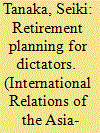|
|
|
Sort Order |
|
|
|
Items / Page
|
|
|
|
|
|
|
| Srl | Item |
| 1 |
ID:
155494


|
|
|
|
|
| Summary/Abstract |
On the eve of the Meiji Restoration in 1868, the nearly 300 semi-autonomous domains across Japan had widely varying tax rates. Some handed over 70 percent of their rice yield to the samurai ruler of the domain, while others provided 15 percent. This variation existed in spite of the similar fiscal demands that the domain rulers faced within the Tokugawa regime—the feudal system that governed Japan between 1603 and 1868. This period was remarkably stable; Japan saw no foreign or domestic wars. This allows us to focus on the impact of pressure from below on taxation. We study the extent to which peasant-led rebellions and collective desertion (“flight”) lowered the subsequent tax rate imposed by samurai rulers. Using newly compiled data on different types of peasant-led political mobilization—from petitions to insurrections—we find an association between, on the one hand, large-scale rebellions and flight and, on the other, lower tax rates. We interpret the results as evidence of rebellious or mobile peasants’ ability to constrain their rulers; the more complacent fail to win concessions. Our findings suggest that peasant mobilization played a role in restricting state growth in early modern Japan through tax concessions.
|
|
|
|
|
|
|
|
|
|
|
|
|
|
|
|
| 2 |
ID:
174128


|
|
|
|
|
| Summary/Abstract |
How are resources distributed when administrative units merge? We take advantage of recent, large-scale municipal mergers in Japan to systematically study the impact of municipal mergers within merged municipalities and, in particular, what politicians do when their districts and constituencies suddenly change. We argue that when rural and sparsely populated municipalities merge with more urban and densely populated municipalities, residents of the former are likely to see a reduced share of public spending because they lost political leverage through the merger. Our empirical analyses detect changes in public spending before and after the municipal mergers with remote sensing data, which allows for flexible units of analysis and enables us to proxy for spending within merged municipalities. Overall, our results show that politicians tend to reduce benefits allocated to areas where there are a small number of voters, while increasing the allocation to more populous areas. The micro-foundation of our argument is also corroborated by survey data. The finding suggests that, all things being equal, the quantity rather than quality of electorates matters for politicians immediately after political units change.
|
|
|
|
|
|
|
|
|
|
|
|
|
|
|
|
| 3 |
ID:
146164


|
|
|
|
|
| Summary/Abstract |
What happens to autocratic leaders who hold competitive elections? Autocrats gain a key benefit by holding competitive elections: a better post-tenure fate. According to my argument, autocrats who introduce competitive elections receive implicit or explicit assurances that they will be able to leave office and retire peacefully. By contrast, failing to hold a competitive election is more likely to result in a violent removal such as execution, prosecution and/or foreign intervention. The paper tests the argument by analyzing a cross-national data set of autocrats’ fates between 1960 and 2004, and the results provide evidence that autocratic leaders who hold competitive elections are more likely to lose power peacefully, and the result holds regardless of regime types.
|
|
|
|
|
|
|
|
|
|
|
|
|
|
|
|
| 4 |
ID:
171118


|
|
|
|
|
| Summary/Abstract |
Sexual harassment is more prevalent for women supervisors than for women employees. This pattern holds in the three countries we studied – the United States, Japan, and Sweden – where women supervisors are between 30 to 100 percent more likely to have been sexually harassed in the last twelve months. Among supervisors, the risk is larger in lower- and mid-level positions of leadership and when subordinates are mostly male. We also find that harassment of women supervisors happens despite their greater likelihood of taking action against the abuser, and that supervisors face more professional and social retaliation after their harassment experience. We conclude that sexual harassment is a workplace hazard that raises the costs for women to pursue leadership ambitions and, in turn, reinforces gender gaps in income, status, and voice.
|
|
|
|
|
|
|
|
|
|
|
|
|
|
|
|
|
|
|
|
|